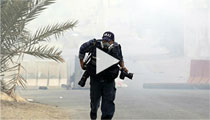Baku viciously cracked down on domestic dissent as it hosted two major international events, the Eurovision 2012 song contest and the Internet Governance Forum. Authorities imprisoned at least nine critical journalists on a variety of retaliatory charges, including hooliganism, drug possession, and extortion. CPJ concluded that the charges were fabricated. International human rights groups, including CPJ, criticized the Eurovision organizer, the European Broadcasting Union, for standing by passively as President Ilham Aliyev’s government jailed and intimidated detractors. The broadcasting union, while expressing concern about the abuses, said the contest was an “apolitical” event. Several independent journalists, including award-winning reporter Idrak Abbasov, were brutally assaulted on assignment, but the assailants, believed to have included police and security officers, enjoyed impunity. Investigative journalist Khadija Ismailova was subjected to a contemptible intimidation campaign after reporting on the ruling family’s extensive business interests. State media smeared her reputation, and anonymous individuals circulated intimate videos and photos. Parliament responded to Ismailova’s coverage by passing legislation giving the president broad immunity from prosecution and barring corporations from disclosing a wide range of financial information. Aliyev signed the bills into law in July.
Azerbaijan
» Imprisonments shoot up as the authorities rely on retaliatory charges.
» Assaults, intimidation reported as Baku hosts major events.
Baku viciously cracked down on domestic dissent as it hosted two major international events, the Eurovision 2012 song contest and the Internet Governance Forum. Authorities imprisoned at least nine critical journalists on a variety of retaliatory charges, including hooliganism, drug possession, and extortion. CPJ concluded that the charges were fabricated. International human rights groups, including CPJ, criticized the Eurovision organizer, the European Broadcasting Union, for standing by passively as President Ilham Aliyev’s government jailed and intimidated detractors. The broadcasting union, while expressing concern about the abuses, said the contest was an “apolitical” event. Several independent journalists, including award-winning reporter Idrak Abbasov, were brutally assaulted on assignment, but the assailants, believed to have included police and security officers, enjoyed impunity. Investigative journalist Khadija Ismailova was subjected to a contemptible intimidation campaign after reporting on the ruling family’s extensive business interests. State media smeared her reputation, and anonymous individuals circulated intimate videos and photos. Parliament responded to Ismailova’s coverage by passing legislation giving the president broad immunity from prosecution and barring corporations from disclosing a wide range of financial information. Aliyev signed the bills into law in July.
CPJ’s worldwide census found that imprisonments jumped in 2012. Baku appeared determined to silence critical voices in a year in which it took the international stage.
CPJ documented a pattern of cases in which Azerbaijani authorities filed unsubstantiated charges of drug possession, hooliganism, and extortion against journalists whose coverage was at odds with official views. All nine journalists jailed on December 1, 2012, had been subjected to such charges.
| 3 | Drug possession |
| 3 | Inciting disorder |
| 2 | Hooliganism |
| 1 | Extortion |
Idrak Abbasov, a journalist with the Baku-based Institute for Reporters’ Freedom and Safety and contributor to several news outlets, was assaulted twice in as many months. When he attempted to report on the demolition of houses by the state-owned oil company, he was brutally assaulted and taken to the hospital with severe injuries. The company accused Abbasov of instigating the attack.
March 1: | Unidentified assailants attacked Abbasov and Rashid Aliyev, a reporter for the online outlet Obyektiv-TV, during a protest in Quba calling for a local governor’s resignation. |
April 18: | Security guards for the state-owned energy company assaulted five journalists, including Abbasov. The reporters were trying to cover the company’s demolition of homes in Baku. Abbasov was hospitalized. |
An ugly retaliatory campaign was waged against Ismailova after she reported on the business interests of President Aliyev’s family. Ismailova made the threats public and continued reporting.
March 7: | Ismailova receives intimate photos in the mail accompanied by a letter warning her to stop reporting. She releases a public statement saying: “I am convinced and determined that I can withstand any blackmail campaign against me. I will continue my professional activity.” |
March 13: | The state-owned newspaper Yeni Azerbaijan publishes an article saying Ismailova leads an immoral life. |
March 14: | An intimate video, purportedly depicting Ismailova, is posted to a website that had been created just days before, according to Emin Huseynov, director of the Baku-based Institute for Reporters’ Freedom and Safety. Links to the video are spread by pro-government outlets and social media, Huseynov says. |

